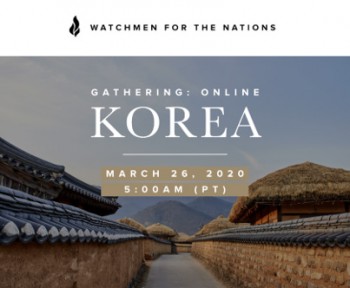Displaying items by tag: Asia
Taiwan: quarantine technology
The island’s phone-tracking system is an ‘electronic fence’, using existing phone signals to triangulate mobile phone owners’ locations. To ensure users comply, an alert is sent to the authorities if the handset is turned off for more than 15 minutes. More than 6,000 people subjected to home quarantine are monitored this way. Officials phone users up to twice a day to make sure they have their mobile to hand, and to ask about their health. Milo Hsieh is under quarantine. Early on Sunday morning, while he was sleeping, two police officers knocked at his door. His phone had run out of battery; in less than an hour four different administrative units had called. Police were dispatched to check his whereabouts. A text was sent saying that the government had lost track of him, and warning of potential arrest if he had broken quarantine.
Watchmen Gathering is Online - 26th March - 5am (Pacific Time)
With the current global pandemic, the South Korean government has requested the cancellation of all gatherings taking place.
Therefore, the locals will no longer host a physical gathering in Korea from March 24th-26th. However, we, as a Global Family, believe 2020 is a year of destiny for Korea and desire to stand with our Korean family at this time.
We invite you to participate by joining us on the GATHERING: ONLINE - KOREA taking place this March 26th at 5AM Pacific Time.
We feel this time together will be a celebration of what God is doing and will continue to do. He is making a wonder out of ONE Korea.
Please note that registration is required to participate in the call.
We are at complete peace, knowing that God is in control of all the shakings. We are humbling ourselves before the Lord to see the fulfillment of the desires of His heart. His thoughts and ways are higher than ours!
Israel: anti-terror technology now counters coronavirus
Israel’s government has approved emergency regulations to enable the Shin Bet to perform mass surveillance of phones belonging to Israelis who contracted COVID-19. This is not to monitor quarantined people, but to track the movements of those found to be coronavirus carriers, to see with whom they interacted in the 14 days before they were diagnosed. Those who were contacted will receive SMS messages instructing them to enter home quarantine. Netanyahu announced the use of these digital counterterrorism measures, as one of several drastic steps to curb the spread of the virus that causes COVID-19. He acknowledged that the digital measures might interfere with people’s privacy, but he argued that Taiwan has successfully used similar means in order to stop the coronavirus spread. Public criticism and warnings by human rights groups mean that authorities must limit these measures to only thirty days.
Iran: good and bad news
Iran has temporarily released tens of thousands of prisoners in recent weeks to stop the spread of coronavirus. Among these prisoners is British-Iranian charity worker Nazanin Zaghari-Ratcliffe She will be required to wear an ankle tag and remain within 300 metres of her parents' home. ‘The issue now is to make it permanent’, her husband Richard said. Pray for this to be the beginning of a permanent release for her. Meanwhile Iran has recorded the highest toll of deaths outside China and Italy. WHO said that 15% of Iran’s deaths were aged under 40. This is unprecedented, as across the world death rate the under 50’s is well below 1%. An Iranian pulmonologist said, ‘Realistically, at this point, the reported sick cases are 1 million.’ As a measure of Iran's desperation, it has requested a $5billion emergency loan from the International Monetary Fund - the first time they have sought western help for sixty years. See
India: police implicated in Hindu riots
As the Hindu mob descended, Delhi market stalls were reduced to ashes, just 100 metres away from two police stations. The mobs came three times; desperate stallholders repeatedly ran to the police stations crying out for help, but the gates were locked from the inside. No help came. ‘How could they set fire to our market in such a horrific way, while it is so close to two police stations, and not be stopped?’ said a shopkeeper. ‘If I complain against the police I will face very serious trouble.’ The worst religious conflict to engulf Delhi in decades raises questions about the role that the police played. 75% of the 51 dead were Muslim, and many Muslims are still missing. The catalyst for the riots is widely acknowledged to be a BJP leader declaring that if the police did not clear the streets of objectors to the new citizenship law, his supporters would be ‘forced to hit the streets’.
China: what can we learn from the Chinese Church?
Pastor Huang Lei leads a church in Wuhan. The coronavirus crisis makes it impossible for his church to have their usual gatherings, so they are meeting online. They are not just doing church, but being church. ‘First, we have more than 50 groups,’ he says. ‘Almost all the groups are meeting via the internet - praying, studying the Bible, sharing, witnessing, praising and worshipping. Of those 50, we have over 30 groups spending two hours every day to pray, worship, share and testify together. That’s far more frequent than our normal meetings. Of course, now we have more free time; everybody is staying at home, so that’s given us the chance to do this. But we usually have the group meeting weekly and now we’re doing this daily. Sometimes even more, so we are very grateful for that.’
A heart-warming story
Spring comes late to Nanai country in the Russian Far East. Ice on the river is three feet thick, after winter temperatures of 40o below zero. Anton, Timur and Misha were sent by Wycliffe Russia to Siberia to learn about the Nanai people and their language. When they arrived at a village, they were welcomed by a leader who was a Christian. His mother, however, was not a Christian and she did not approve. The Bible translators demonstrated a Nanai audio dictionary to a small group, including the disapproving mother. She was not a believer, but she was passionate about her language and was surprised to find that Anton and his friends shared her passion; so she accepted them and became their friend. After hours discussing the language using Bible stories, the conversations turned to God. The leader’s mother listened intently, no longer disapproving. Because these visitors were interested in her language, she was now interested in their God. See also the world article on Tajikistan.
Israel: Jewish-Arab partnership?
On 2 March Israel held its third election in a year. Already huge Likud roadside billboards bearing the faces of Blue and White and the Arab Joint List leaders have been erected, stating, ‘Yes to a Jewish and democratic state, no to supporters of terror.’ Israel’s elections are not over. The party headed by Benjamin Netanyahu continues its campaign against the formation of a minority government by Blue and White with the support of the Joint List. Foreign minister Katz called members of the Joint List ‘terrorists in suits’. 64% of Arab voters support the Joint List joining the government, but the right-wing/ultra-Orthodox and many of the general public, including Blue and White voters, don’t. Knesset members are receiving constant curses and insults by those against such cooperation. Is Israel prepared for real cooperation between Jews and Arabs at the highest level?
Tajikistan: fined for Bible translation
As well as targeting individuals for exercising their freedom of religion and belief, Tajikistan’s regime also targets Christian communities. For example, the Full Gospel Protestant Church's two buildings in northern Tajikistan have both been confiscated. One of them had a vision in 2018 for a kindergarten to open there - but in 2020 there is still no sign of it. Between August 2019 and January 2020, the state fined leaders of four Protestant churches between £574 and £902 each (the average monthly offering in some of these churches is £41, the average monthly salary about £123). ‘They were fined for arranging a translation of the Bible into modern Tajik’, a local Protestant said. The translation is needed as some Christians think that other translations use archaic words and some passages are unclear.
Afghanistan: pray for change
Afghanistan’s population is 99.9% Muslim, containing 72 unreached people groups. There are 48,000 mosques and no churches. Any belief contrary to Islam is illegal. Converting from Islam to Christianity results in death. Christian believers gather and worship in secret. Yet extremist violence has caused many Muslims to question their faith. Though impossible to document, it is undeniable that the Church is growing and Muslims are turning to Christ. Some encounter Jesus in dreams and visions; others hear the Gospel through Christian radio. Christian relief agencies also share the love of God through meeting the nation’s immense physical needs; some have died as martyrs. Amid great persecution, there are several thousand believers in Afghanistan today. War and violence are almost routine, and many have given up on anything ever changing. That is what made the recent historic agreement between the United States and the Taliban so monumental.









